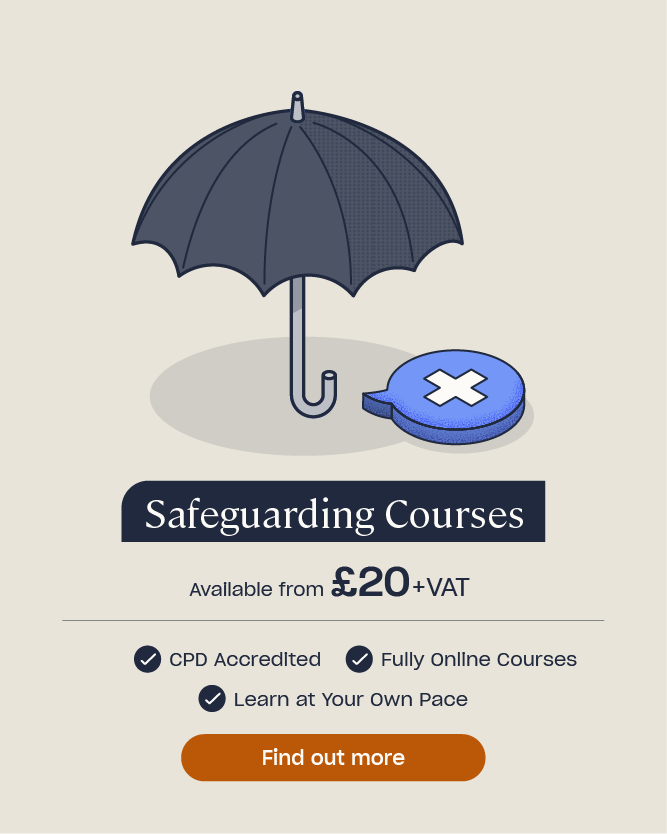Understanding Why Children May Stay Quiet About Abuse
We all have a responsibility to safeguard children and young people, regardless of our age, profession or background, but those who work in educational settings and who have regular contact with children have a particularly important role to play. In this article, we’ll look at why children may stay quiet about abuse they’re experiencing, why they may not tell you what’s happening and what you can do if you suspect that a child in your care is being abused. Speaking out isn’t easy for anyone, especially children, which is why it’s vital you give them a voice and speak out for them.

What is Child Abuse?
Child abuse is any type of maltreatment towards a child, whether the harm is caused by an adult or by another child. For some children, the abuse they experience is a one-off action. For others, child abuse can be prolonged harm that happens over the course of months or even years of their life.
There are four main categories of child abuse: emotional, physical, sexual and neglect, but there are also many other types of maltreatment within these groups. Abuse can happen in-person or online, at any time, anywhere and to anyone.
The signs of abuse vary depending on the type of abuse and the particular child – some children may display obvious signs, such as bruising in the case of physical abuse, whereas others will be more subtle, such as behavioural changes as a result of emotional abuse.
It’s important to note that children are skilled at hiding the abuse they’re experiencing and are unlikely to tell you anything about it. Therefore, it’s vital that you know how to recognise the warning signs so you can report it for them.
Why Do Some Children Not Report Abuse?
There are many reasons why children don’t report abuse, despite you being a friendly face who is willing and able to help them. Even if you make yourself as open as possible and encourage children to speak about their feelings, the abused child may still choose to keep their experiences of abuse hidden from you. This could be for a variety of reasons:
The child may not understand what’s happening to them
This is especially true for younger children, children with disabilities or children with learning difficulties, who may not recognise what’s happening to them as abuse. Furthermore, if the child is being abused by someone that they know, trust and love – such as a friend or family member – then they may believe that the abuse is normal and not see it as being wrong. This is particularly true if the abuse has been going on since they were very young so, to the child, it’s just a normal part of their life.
The child may feel guilty or to blame for the abuse
Some children may blame themselves for what’s going on and may feel as if the abuse is their fault – a punishment for something – so they don’t want to ‘own up’ to it in case they get into further trouble. The child may believe that they’ve done something to deserve the abuse.
The child feels ashamed or embarrassed
Many children and young people will feel embarrassed about what’s happening to them, so don’t speak out because of the shame. This is often because they feel partly to blame for what’s going on, so they don’t want to admit to it and find it easier to just keep quiet in order to prevent further humiliation.
The child worries that you won’t believe them
It takes a lot of courage for a child to approach an adult and disclose information about abuse, so it’s understandable that they may choose not to say anything just in case the adult doesn’t believe them, laughs at them or dismisses them. It could also be the case that the child has tried to tell someone before but they’ve had a poor response or no action was taken by the adult to help.
They may not have the ability to speak out
Young children, those who have a disability or learning difficulty or children who have English as a second language simply may not have the words to describe what is happening to them. Children with additional communication needs like these will struggle to name their feelings or describe their experiences, so don’t say anything at all.
The child thinks they’ve got no one to tell or has never been asked
In some cases, it may be that the child is simply waiting for someone to notice that something isn’t right. The child may not have the courage or opportunity to speak out and may be hoping that a trusted adult will approach them and ask what’s wrong. In other cases, it might be that the child believes they don’t know a trusted adult who they can talk to – which is why it’s so important that you proactively fill this role and let all children know you’re there to help.
The child may be afraid of the consequences of speaking up
Children often hold back from telling someone about abuse because they’re scared of what might happen next – they may worry about getting into trouble, may be worried about how you’ll react or may fear the abuse getting worse. The child is also likely to be frightened of what will happen if their abuser finds out they’ve told someone. Fear is a significant reason why children don’t report abuse.
The child may be hoping that the abuse will stop
A child may refrain from speaking out about the abuse they are suffering because they believe that the situation is only temporary and that it will soon stop. Any child of any age and in any situation can believe this, but it’s especially common amongst older children who believe they are in a loving relationship with their abuser. As a responsible adult, it’s a good idea to educate children about healthy relationships to prevent situations like these from arising.
Looking to Learn More?
Do you work in education or a setting where children and young people are present? Then take a look at our full range of Safeguarding Children Courses and see how you can improve your knowledge further. We all have a responsibility to safeguard children.
What to Do if a Child is Being Abused
If you have concerns, worries, suspicions or evidence that a child is being abused, no matter how minor, it’s vital that you act straight away. Don’t wait until you’re certain about abuse or until a child has disclosed something to you, as this could be too late – act now.
There are various ways you can report and record a concern about child abuse:
- If you know that a child is in immediate danger, call the police on 999 straight away.
- Report your concerns to the Designated Safeguarding Lead (DSL) at your setting who will know what to do next and escalate your concern further.
- Report your concern directly to your local authority’s child protection team. You can find your local team here.
- Contact the NSPCC on 0808 800 5000. They will then pass the concern onto your local child protection team who will investigate it.
- Record any physical signs of injury on a Child Protection Body Map for future reference.
There are various reasons why you, the responsible adult, may be hesitant to report child abuse concerns. You might be worried that you’re wrong, might be afraid of what will happen next, may be worried that you won’t be listened to or may be anxious about getting someone you know into trouble. Whilst these are all valid reasons to be hesitant, they are not reasons that should prevent you from reporting abuse. If you don’t share your concerns, then the child is likely to be in danger. All children deserve to be safe, healthy and happy, and you reporting concerns is an important first step in getting them the help they need.
On the occasion that a child does reveal details of abuse to you, the NSPCC provides the following step-by-step guide on how to respond appropriately:
- Listen carefully to what they’re saying – be patient and focus on what you’re being told. Try not to express your own views and feelings. If you appear shocked or as if you don’t believe them it could make them stop talking and take back what they’ve said.
- Give them the tools to talk – if they’re struggling to talk to you, show them Childline’s letter builder tool. It uses simple prompts to help them share what’s happening and how they’re feeling.
- Let them know they’ve done the right thing by telling you – reassurance can make a big impact. If they’ve kept the abuse a secret it can have a big impact knowing they’ve shared what’s happened.
- Tell them it’s not their fault – abuse is never a child’s fault. It’s important they hear, and know, this.
- Say you’ll take them seriously – they may have kept the abuse secret because they were scared they wouldn’t be believed. Make sure they know they can trust you and you’ll listen and support them.
- Don’t confront the alleged abuser – confronting the alleged abuser could make the situation worse for the child.
- Explain what you’ll do next – for younger children, explain you’re going to speak to someone who will be able to help. For older children, explain you’ll need to report the abuse to someone who can help.
- Report what the child has told you as soon as possible – report as soon after you’ve been told about the abuse so the details are fresh in your mind and action can be taken quickly. It can be helpful to take notes as soon as you’ve spoken to the child. Try to keep these as accurate as possible.
There are many reasons why children might stay quiet about abuse and may not report abuse to you. The child is likely to feel ashamed, fearful and worried about what is happening to them and may fear that speaking out will cause the problem to get worse. As an adult, it’s your responsibility to look out for the signs of abuse and do all you can to support children, whether they speak out about abuse to you or not.
Further Resources:
- The Different Forms Of Child Neglect
- Warning Signs of Child Sexual Exploitation (CSE)
- Signs of Abuse in Children
- Introduction to Safeguarding Children Course
- Child Exploitation Quiz
- How to Create an Effective Culture of Safeguarding in Schools







